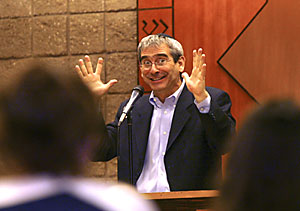 |
|
KEVIN B. KLAUS / Arizona Daily Wildcat
|
Rabbi Steve Greenberg elaborates on his experiences as an orthodox rabbi and homosexual Thursday night in the UA Hillel Center. Greenberg's lecture was part of the Temple Emanu-El's Rabbi Albert T. Bilgray "Living Judaism" series.
|
|
|
By Cassie Tomlin
Arizona Daily Wildcat
Tuesday, February 8, 2005
Print this
To be an Orthodox gay rabbi is to be a duck-billed platypus.
That's coming from someone who knows - Rabbi Steve Greenberg, the first openly gay orthodox rabbi, who spoke to about 70 students and other Tucsonans last Thursday night in the UA Hillel Center.
Greenberg traveled to Tucson from New York City to speak as part of Temple Emanu-El's Rabbi Albert T. Bilgray "Living Judaism" speaker series.
Greenberg shared his Jewish history, his experience being part of the film "Trembling Before G-d," and his views on gay marriage and homosexuality in Orthodox custom. Greenberg also discussed his book "Wrestling with God and Men: Homosexuality in the Jewish Tradition."
Orthodox Judaism does not condone homosexuality and does not allow homosexuals to become rabbis.
Greenberg was not publicly gay for more than 10 years after he finished rabbinical school.
Greenberg said that he interprets the biblical prohibition on homosexuality differently than Orthodox custom, and said the one place in the scriptures that bans "lying with another man" focuses on humiliation more than homosexuality.
"Jewish law is not a science detached from life," he said.
Rabbi Sam Cohon, of Tucson's Temple Emanu-El, said homosexuality is broadly accepted in Reform Judaism and there are many openly gay reform rabbis, but he does not see Orthodox resistance to homosexuality fading any time soon.
Greenberg said the Orthodox community is attempting to address homosexuals as little as possible.
"Most Orthodox people have never met a gay person; they've only seen them on a screen in a tutu on a float," he said. "It is totally other in the Orthodox community."
Greenberg said common Orthodox sentiment holds that homosexuality is a curable disease or moral illness. He said that once the Orthodox community realizes homosexuality is not a changeable condition, they will not be able to ignore it anymore.
"It's a fact of a human's makeup and therefore a problem not with the person, but with the law," Greenberg said.
Greenberg was not raised Orthodox, but converted from Reform Judaism "out of rebellion and boredom" when he was 15 years old.
Greenberg said he first noticed feelings of attraction towards another man when he was 20 years old while studying in Israel. Greenberg said he went to a rabbi in Jerusalem to seek counseling over his frightening discovery. The rabbi told Greenberg, "You have twice the power of love, use it carefully."
Greenberg said the advice helped him manage his feelings, although he remained vulnerable to the "crushing weight" of Orthodox rule.
Maudree Callahan, a religious studies freshman, said she identified with Greenberg's conflictions between religion and sexuality.
Callahan, whose father is a Pentecostal pastor, said Pentecostalism views homosexuality as an abomination.
"I'm Christian and gay, and according the Bible I'm going to hell," said Callahan, an Associated Students of the University of Arizona Pride Alliance member. "I don't even know how I feel about that."
Drew Alyeshmerni, a Judaic studies sophomore, said Greenberg's speech was powerful in helping her accept Jewish homosexuals without feeling guilty about it.
"Now I have the argument to back up how I feel," she said. "I can look at the context of the scriptures banning homosexuality, which don't directly address it, and therefore it's up for interpretation."
Alyeshmerni, co-chair of Kesher Connection for reform Jews on campus, said she hopes in her lifetime she will see the Orthodox community become indifferent to homosexuality.
"I don't know if I'll see it become accepted, but its going to have to come to a don't ask, don't tell thing," Alyeshmerni said. "I hope there will be a change in the taboo where it's not on being gay, but on being openly anti-gay."
Greenberg said he was asked four times to be in the film "Trembling Before G-d," before he finally agreed. The film was made in Israel and documented Orthodox Jewish people who are homosexuals.
Sandi Simcha Dubowski, the filmmaker, asked Greenberg to come out publicly a week before the open house of the film, in March 1999, and he did. The film later won Official Selection at the 2001 Sundance Film Festival.
Greenberg said the filmmakers scoured the earth for few willing to speak.
"The film brought forward voices that couldn't have been heard beforehand," Greenberg said.
Michelle Blumenberg, Hillel Center executive director, said Greenberg's visit to the UA was particularly important given recent social issues.
"Why now, what's going on in society that in America these issues are now being discussed," she said.
Greenberg said he believes Jewish wedding ceremonies "too straight and patriarchal" for homosexual marriages, but believes in civil marriage between homosexuals.
Greenberg said he has also speculated on God's purpose for creating gay love.
"I believe it's the possibility of sharing power and love without hierarchy," he said.
